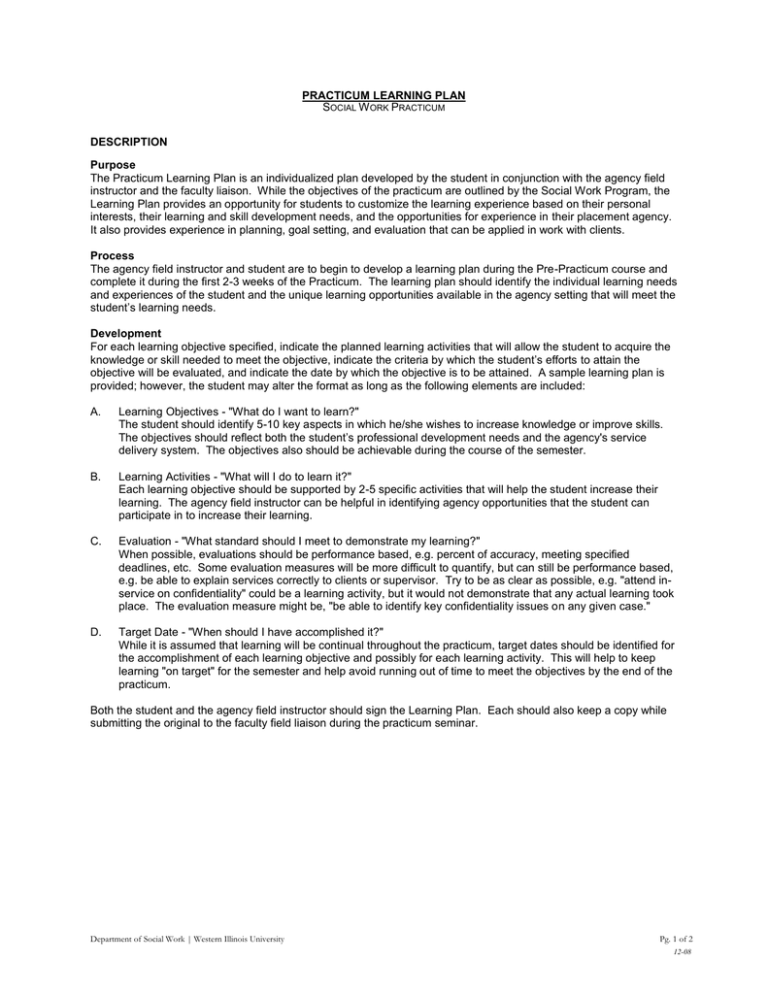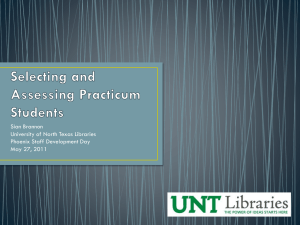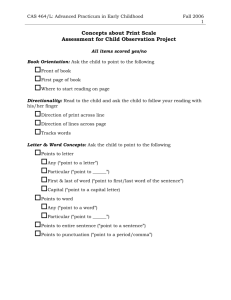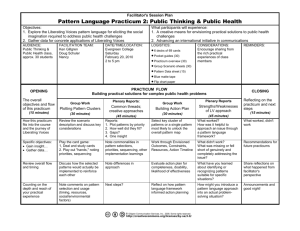PRACTICUM LEARNING PLAN DESCRIPTION Purpose
advertisement

PRACTICUM LEARNING PLAN SOCIAL W ORK PRACTICUM DESCRIPTION Purpose The Practicum Learning Plan is an individualized plan developed by the student in conjunction with the agency field instructor and the faculty liaison. While the objectives of the practicum are outlined by the Social Work Program, the Learning Plan provides an opportunity for students to customize the learning experience based on their personal interests, their learning and skill development needs, and the opportunities for experience in their placement agency. It also provides experience in planning, goal setting, and evaluation that can be applied in work with clients. Process The agency field instructor and student are to begin to develop a learning plan during the Pre-Practicum course and complete it during the first 2-3 weeks of the Practicum. The learning plan should identify the individual learning needs and experiences of the student and the unique learning opportunities available in the agency setting that will meet the student’s learning needs. Development For each learning objective specified, indicate the planned learning activities that will allow the student to acquire the knowledge or skill needed to meet the objective, indicate the criteria by which the student’s efforts to attain the objective will be evaluated, and indicate the date by which the objective is to be attained. A sample learning plan is provided; however, the student may alter the format as long as the following elements are included: A. Learning Objectives - "What do I want to learn?" The student should identify 5-10 key aspects in which he/she wishes to increase knowledge or improve skills. The objectives should reflect both the student’s professional development needs and the agency's service delivery system. The objectives also should be achievable during the course of the semester. B. Learning Activities - "What will I do to learn it?" Each learning objective should be supported by 2-5 specific activities that will help the student increase their learning. The agency field instructor can be helpful in identifying agency opportunities that the student can participate in to increase their learning. C. Evaluation - "What standard should I meet to demonstrate my learning?" When possible, evaluations should be performance based, e.g. percent of accuracy, meeting specified deadlines, etc. Some evaluation measures will be more difficult to quantify, but can still be performance based, e.g. be able to explain services correctly to clients or supervisor. Try to be as clear as possible, e.g. "attend inservice on confidentiality" could be a learning activity, but it would not demonstrate that any actual learning took place. The evaluation measure might be, "be able to identify key confidentiality issues on any given case." D. Target Date - "When should I have accomplished it?" While it is assumed that learning will be continual throughout the practicum, target dates should be identified for the accomplishment of each learning objective and possibly for each learning activity. This will help to keep learning "on target" for the semester and help avoid running out of time to meet the objectives by the end of the practicum. Both the student and the agency field instructor should sign the Learning Plan. Each should also keep a copy while submitting the original to the faculty field liaison during the practicum seminar. Department of Social Work | Western Illinois University Pg. 1 of 2 12-08 Examples of Practicum Learning Objectives/Activities The Practicum is a good time for the student to obtain a wide variety of experiences which will increase the student's knowledge about the profession and the agency and its clients and improve the social work skills needed to work in a social work setting. Some of the kinds of experiences that a student might have are listed below. 1. 2. 3. 4. 5. 6. 8. 9. 10. 11. 12. 13. 14. 15. 16. 17. 18. 19. 20. 21. 22. 23. 24. 25. 26. 27. Read portions of the agency manual(s) to learn about agency responsibilities, organization, policies and procedures for serving clients. Read old case records. Observe another worker conduct an interview. Attend a meeting and take notes. (Meetings can be within the agency, public meetings, inter-agency meetings.) Attend case presentations or agency staffings. Sit in the waiting room and observe the atmosphere, conversations, and behaviors of clients. Attend a court hearing regarding agency clients. Attend in-service training or workshops provided by the agency for its staff. Watch videos or review training materials made for agency personnel. Co-lead a group. Go with another worker on a home visit. Answer the agency phone for a period of time to learn what types of calls the agency received. Interview agency program directors to learn more about agency programs and organization. Serve on an agency committee. Plan an in-service training program in a specialty you have researched for agency personnel. Organize a fundraiser for your agency. Develop a directory of community services for the area your agency serves. Process record an interview and critique it. Tape record an interview and discuss it with your supervisor. Carry a small caseload for a time. Follow a case through from intake to completion of service. Fill out agency forms and document contacts with clients. Write a report for the agency or for court in regard to a client. Supervise a visit between a client and their children. Teach a client a new skill or set of skills. Accompany a client to court or to another agency to apply for service. Department of Social Work | Western Illinois University Pg. 2 of 2 12/08





